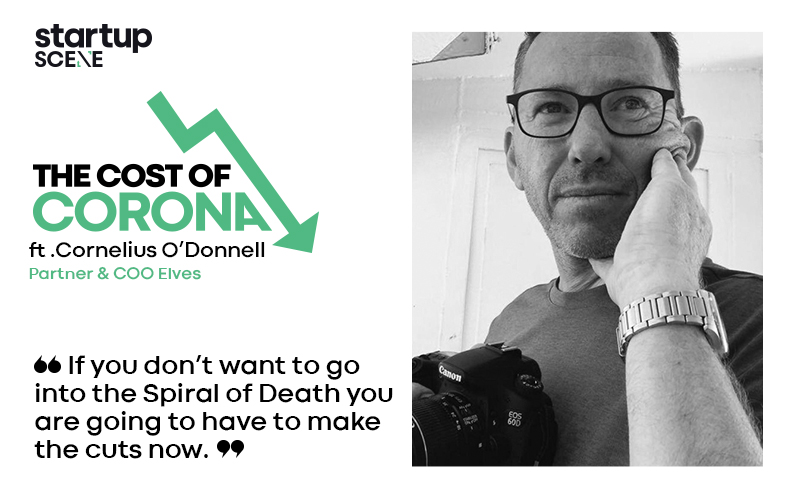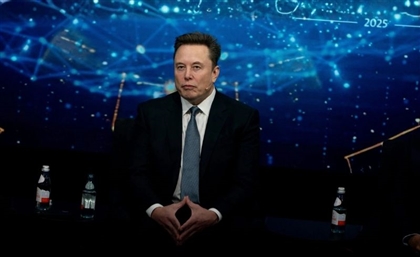THE COST OF CORONA ft. Cornelius (Con) O’Donnell, Partner & COO Elves
“The mantra right now is survival of the quickest. Hope for the best but plan for the worst.” Serial entrepreneur Cornelius O’Donnell shares his advice in this candid conversation about businesses and startups surviving the Coronavirus crisis.

In this new #StartUpScene series, MO4Network co-founder and CEO Amy Mowafi speaks candidly to some of the region’s leading entrepreneurs about ‘The Cost of Corona’. With founders across the world finding themselves having to make drastic decisions at unprecedented speeds we ask respected stakeholders from across diverse sectors to share - as honestly and transparently as possible - what they think it will take to go from virus to viability, what decisions they’ve made for their own businesses and how they’re personally navigating these extraordinary circumstances.
First up is serial entrepreneur and one of the most respected individuals in the regional ecosphere Cornelius O’Donnell, currently a partner and COO at Elves. The 'in-chat personal assistant that gets your to-dos done' raised $2million in its 2017 seed round, and O’Donnell, an active angel investor, was one of its first supporters. His prolific portfolio also includes Cairo-born startups Wuzzuf and Eventtus.
This conversation took place on Thursday March 26th 2020 and parts of it have been edited for brevity and clarity…
Amy: So Con, let’s start at the top. What the f*&k, as entrepreneurs, are we supposed to do?
Con: You have to move fast and whatever you’re going to do has to be done now. You cannot wait to see if you’re going to be able to ride this out or if things are going to get better, so the mantra is survival of the quickest. You need to make fast decisive actions and hope for the best but plan for the absolute worst-case scenario. So the best case is a couple of weeks of disruption, the worst case is a year or two. So bite the bullet and plan for that.
Amy: Are you SERIOUS? You want entrepreneurs to plan for a year or two?
Con: I’m telling you; plan for the worst.
Amy: So you’re asking me to try to model my business as if I’ve got to survive like this for two whole years?!
Con: Let’s use Elves as an example. Apart from having to work out how to work from home, we also looked at past global crises, like the 2008 recession, to see what companies that survived did and why other companies failed. We had a look at the data and we looked at our context, and the ones that survived made big cuts to the burn rates fast and immediately. And the ones who did not survive made incremental changes, as things got worse. And they crashed and burned. They called it the ‘Spiral of Death’. So if you don’t want to go into the Spiral of Death you are going to have to take the cut now. And the cut is really hard. So if I have enough cash or income or anything that is only going to last me two or three months, I have to find a way to make it six months or twelve months. So the first and most dramatic and drastic thing are salary cuts. The challenge is your business and its success is still dependent on the people you have, the people are your biggest asset. The challenge is how do you maintain people and look after them and make sure they are safe and they are working and getting an income because you know that anything you do in these times will impact them immensely.
Amy: OK, so how do you do both?
Con: In our case we had a lot of support staff, middle management, senior management or HR or training or evaluations. They are important to the business of course but they are not the ‘core’ of the business. Core to our business is the person chatting with you on the phone, the person taking your order and delivering to wherever you are. The actual ‘Elves’. And as we’re a tech company, the engineers are core to our business. So without those three main functions we simply can’t serve our customers and if we can’t do that then we’re really in trouble. Now let’s take it a step further, we were lucky that most of the people in our ‘support’ functions started off doing our core functions. They were talented and committed so they moved up through the organisation as opportunities arose. So basically what we are doing is taking all those people back to those core function. Back to the ‘elving’, or back to taking things to people’s houses. Get into the core of the business and you’re saved.
Amy: Surely that means you now have an excess of that kind of function?
Con: Well exactly, so here is what we did next. We were on a traditional business model doing a 40 hour week but in shifts and with a monthly salary. We had to figure out a new model. We had a chat with all our teams, we spelled out what a massive challenge this is while being very open and transparent about what we’re facing and we explained clearly that we were going to have to make our operation 50% less costly. How are we going to do that? They were worried about salary cuts and people being fired, those were the main concerns. So one solution was to not cut their salary but to work on an hourly rate and cut their hours. So they have more hours in the day for themselves or to freelance and they are paid for the smaller number of hours they work. Then we create a roster for everyone. If at any point we need more man-hours we call them up. It’s tough but every business needs to understand that if they don’t take these decisions now, in three months time there won’t be a business.
Amy: Does this mean you didn’t have to lay anyone off?
Con: There were some lay-offs, the people who just didn’t fit the new model, the ones who had evaluations and were given feedback and hadn’t improved. But as much as possible we tried to keep people on.
Amy: I’ve been thinking a lot about that, if I can be more streamlined now and still deliver, does that mean I was making poor management or growth decisions beforehand?
Con: What happens is you have people who don’t heave tightly defined roles or they are in transition from one role to another. These people become stuck in the cracks when you’re growing. They are good people and you want them around you just don’t have the time as management to manage them. So you send them off to do their thing, but you’re not really paying attention and you often depend on the next person down the line to take care of that. And in circumstances like this you just can’t afford to have those situations continue.
Amy: Look, I guess as entrepreneurs we are all used to having to make pretty tough decisions and over time we figure out how to make those calls and learn how to live with them. It’s part and parcel of the journey and it took me a while, but I get that. However, this is on another level and I think very few of us have ever had to make such drastic decisions at such scale and such speed. These are hefty decisions and you are directly responsible for a lot of people. How do you even begin to process or handle that while still maintaining the cool and calm required to navigate and lead the rest of the company?
Con: I could never be a surgeon for example. They have to make a decision like ‘am I going to remove this person’s leg from the knee or the hip? If I remove it from the knee there’s a 50% chance that the problem will keep growing to the hip. If I remove it from the hip there’s a hundred percent chance that I will save the body.’ That’s where it is for all of us right now and of course none of us are wired for that decision, because at the end of the day you’re still cutting someone’s leg off.
Amy: What’s the process practically, Con? What were the procedures, step-by-step, that you took?
Con: So we had that initial shock meeting with just the partners on the Wednesday. By Thursday we involved all of our main teams into the shock of this. We explained where we were, where we needed to go and took their ideas. On Sunday morning, we regrouped with an action plan and everything in place, the models, the corner cases etc. On Sunday afternoon we had an all hands meeting – we call them town halls – and asked every person in the company to come on the call for that. That’s when Kareem the CEO spelled it out completely, transparently and clearly. He said this is what the reality is and this is how it’s going to work and this is what we have to do. Of course all their fears come out straight away and there’s a lot of uncertainty. So at that point you have to move very fast because everyone’s thinking ‘I’m going to get axed’. We made all the individual calls, explained everything and at 8pm let everyone know all the calls had been made so everyone would know their position. The following day you come out with a detailed plan of what’s happening and the way forward. Now you’ve communicated it, everyone needs to get back to work, everyone needs to be on the ball; we still need growth, we still have to keep our customers.
Amy: OK let’s talk about pivoting. Something like this happens and the buzzword immediately becomes “pivot”. How are you guys pivoting? Where does one start when it comes to thinking about “pivoting”. I mean we’ve done it plenty of times but these are extraordinary circumstances and decisions need to be made at lightning speed. It’s a whole new ball game…
Con: So in this climate some things obviously will no longer be viable for your business. So in our business the first things that went were flights and hotels. So we ask ourselves what are people still doing or doing more of or have a challenge doing? One of the things we shifted to immediately was bill payments. Everyone has a bill to pay every month, so if we can make that process smoother and safer in the circumstances, and if we can do it better than anyone, there is potential for growth there. People are afraid to leave their houses, and rightly so - why would I go into a crowded place if somebody else can do that for me? Well, Elves can because that is the core of what we do. So very early on – around mid-Feb - we started ordering all the kits for our couriers, with the sprays and gloves and the masks, and we started training them on how to do contactless delivery.
Amy: Wow, mid-Feb! That is far earlier than a lot of local businesses started to take any real action. I guess with great experience comes great foresight Con!
Con: Before the storms happened we already had the kits in place, the training and the methodology behind it. So how it works is we bring the stuff to the office, we sanitise it, then we seal it inside another bag, sanitise that bag, take it to your door, sanitise it again at your door because it’s been out in the wild. We ring your doorbell and let you pick it up. And no cash is exchanged because you have already paid online. It’s a cashless, contactless solution to a very specific problem now.
Amy: What else can we look out for Con to help sustain our businesses?
Con: Well you also have to take the shitty jobs that you would usually turn down! There are clients you might usually think just aren’t worth the hassle and you need to focus elsewhere. Right now they’re a lifeline and all of a sudden you have the capacity to take them on. You’ve got talent, you’ve got people, and you’ve got time, how can you use that to service different parts of the market where people are still willing to pay?
Amy: OK, now let’s talk about… INVESTORS! That’s another tough conversation a lot of entrepreneurs are going to have to face right now…
Con: You have to have that very frank honest conversation with your investors that you are at point A and you’re trying to get to point B and this is your plan and this is how you are doing it and you are implementing it now because you might need extra cash from those guys. So they need to know you have a plan, you’re executing on that plan and that plan makes sense. You’ve got to share that with them very quickly so they’re in the loop. That is very important for a lot of the businesses that have investors in them - could be their friends and family but it’s also venture capital or angel investors. You’ve got to bring them into the light of what you’re doing and show them you’ve got the leadership, you’re going to save the business, and this is how you’re going to do it. And ask for their help. Often there is something they can do, maybe they can throw you some business!
Amy: Now all of this sounds great in theory, but when all is said and done, and all the calls have been made, and there are some people who have been laid off, and everyone else are on less salaries, and investors and landlords and creditors held at bay, and debtors avoiding your calls, how on earth do you then set about keeping the machine – or what’s left of the machine – going?
Con: It’s not easy. People are staying at home demotivated, with parents or kids or pets or all alone. They are worried and scared. You’ve got to now find the tools and the means, however small, to support them and keep them focused. For us that meant giving everyone some allowance for mobile Internet, as we have no idea what everyone’s ADSL set up is like. We were able to do that fast because everyone has an Elf Wallet so we just uploaded the money to their wallet so they could spend it on their mobile or whatever else. We obviously have some advantages that other companies don’t and we make use of them. But you can’t expect people to work and show up to calls if they’re not connected, internet is a basic.
Amy: And are there any specific tools or apps or resources you recommend to make things more efficient when you have big groups of people working remotely?
Con: Zoom of course is fantastic and I have seen yoga instructors and weight lifters doing classes on Zoom, which is also a great business opportunity for Elves. When I see that I think, well how are people going to subscribe and how are people going to pay? You can do a payment on Elves and we can consolidate and give you your money at the end of the month in one transfer.
Basecamp is also great for sharing to-do lists, keeping everyone informed of what is happening and you can set it up as a daily reminder. We have one in the morning and one at night. So for example, ‘What do you want to achieve today?’ and it arrives automatically at a set time, so I get a notification at six am and then before I go into the partners' meeting on Zoom I have already filled that in so everyone can see whatever everyone else is doing and we don’t have to have that part of the conversation. And then at the end of the day you get a notification that asks how your day was and that’s where you can say, “well it was crap and I didn’t get half of what I wanted done.”
We also use Workplace and Workchat for comms and social stuff and keeping in touch. And naturally Whatsapp for things on the fly.
Amy: Let’s talk about YOU personally Con, what are you doing to keep yourself sane, to keep yourself efficient, to keep yourself going I guess…
Con: I’m not sure I can manage to sane! I’m touching base with my friends and family, making sure we are getting on phone calls, not messaging but hearing other human voices and checking everyone is OK. To reduce my anxiety about other people’s situations I check in frequently. You’re never too busy now. Meanwhile at home I’m splitting the chores with my wife Pascale. So while she is on top of the kids’ heads to study I am preparing lunch. I play with them while she might be doing laundry. We’re reading a chapter a day of Harry Potter. We divide things up day by day according to how much we have on our plates. And I use my bike for zooming around town for urgent errands like going to the ATM.
Amy: Are you binge-watching anything on Netflix?
Con: I don’t think I need any more drama in my life right now!
Amy: What about reading? Anything that’s helping to keep you motivated or in the right head space right now?
Con: Well for a start I’m staying away from self-help business books. I have a whole list of biographies I want to get to, including Malcom X, I think it would be especially interesting right now. I’m also reading a lot of in-depth stories about the economy and the virus, about the impact on society and transformations. The New Yorker and The Atlantic have some really interesting stories right now. I think it’s important to not just get stuck in the present but to really start to think about what the world is going to look like six months or a year from now. How will people move around, how will people come together in groups, how will businesses function, how will we be transformed, what will it all look like?
Amy: OK Con, last question, is this the end of the world?!
Con: Hahaha, only for humans!






















